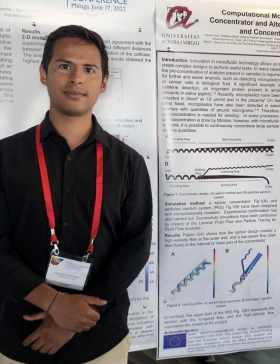Jesús David Coral Pérez


PhD Programme: Nanoscience, Materials and Chemical Engineering
Research group: FiCMA – Physics and Cristallography of Materials
Supervisors: Xavier Mateos Ferré & Rosa Maria Solé Cartaña
Bio
Jesus David Coral Perez holds a Bachelor degree in Chemical engineering from the University of La Sabana (Colombia) in 2016, Subsequently, he worked as an R&D Engineer in Stepan Company S.A developing formulations for the cosmetic, householding, and industrial field from 2014 to 2016. Interested in 3D design and 3d modelling, after his bachelor, he took a programme in animation and 3D modelling, provided by the Politecnico Indoamericano, Colombia. in 2017 he moved to Peru where he was working as a technical representative in Quimicos Goicochea Company. He started a Master degree in Nanoscience, Materials and Processes: Chemical Technology at the Frontier at the URV, and obtained the degree in 2020.
Project: Non-small cancer cells detection device through saliva as non-invasive screening method using microfluidic and opticat technology
Cancer is a disease caused by various internal or external factors that alter the genetic code of cells. Few million diagnoses of cancer per year appear to be one of the most prominent problems that humans have to face in the next years. As an example, 1.7 million deaths per year are associated with lung cancer. Human secretions can present small concentrations of cancer cells in patients with cancer affectations. for this reason In the present project, the design, fabrication, and characterization of a functional microfluidic device with optical detection is aimed to study cancer cell detection and quantification. The advances with respect to the state-of-the-art are related to the miniaturization, easy operation, and increased sensitivity and selectivity with respect to other understudy approaches. this project includes the computational design of the microfluidic device using Computational Fluid Dynamic (CFD), the fabrication of different operational units at the microscale to control the physical behavior of particles/cells in a channel, The optical detection of the microparticles/cells by means of an optical system, which might include transmisión, luminescence, and/or Raman spectroscopy. and finally, the creation of a device that will contains this new technology.
Outreach activities
- European Researchers' Night 2022: "Fluídica para todos".
International secondment
- University of South Eastern Norway, Norway. 3 months (2023).



